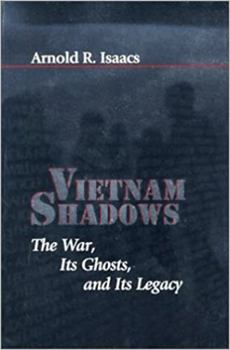Vietnam Shadows: The War, Its Ghosts, and Its Legacy
Select Format
Select Condition 
Book Overview
Post war reflections by those who were there.
Nearly a quarter-century after the fall of Saigon, the memory of America's defeat in Vietnam continues to haunt the national psyche. In Vietnam Shadows, former war correspondent Arnold Isaacs turns his reportorial eye to the conflict since Vietnam, covering the skirmishes and firefights of a cultural battle--some would say stalemate--that refuses to end.
Isaacs takes on the popular myths and misconceptions about Vietnam--among them the mistaken belief that the U.S. military lacked clear goals. ("In many conversations with U.S. officers in Vietnam, I do not recall discovering any who were in doubt about what they were supposed to do there.") He exposes the myth of the MIAs--a myth sustained not only by grieving relatives but also by professional con men of breathtaking cynicism--and shows how the many false MIA stories may nonetheless reveal a deeper truth: "We lost something in Vietnam and we want it back." Isaacs talks to the veterans unable to forget the war no one wanted to talk to them about. He explores the class divisions deepened by a conflict in which the privileged avoided service that an earlier generation had embraced as a duty. (691 Harvard alumni died in World War II, Isaacs points out; in Vietnam, nineteen.) And he shows how the "Vietnam Syndrome" continues to affect nearly every major U.S. foreign policy decision, from the Persian Gulf to Somalia, Bosnia, and Haiti.
Capturing the ironic legacies of a war that abounds in them, Isaacs introduces the "new Americans"--the Vietnamese, Thais, and Cambodians--who fled Indochina to settle in the U.S., where fashion spreads in the New York Times Magazine feature models photographed in Vietnamese settings wearing "Indo-chic clothes" that sell for four to five years' income for the average Vietnamese. ("Farm girl's jacket in 'periwinkle blue' raw silk: $1,460 by Richard Tyler.") And he recounts the experiences of Americans who have returned to Vietnam, only to find their former enemies turned entrepreneurs--such as the operators of a popular Saigon bar called Apocalypse Now.
Isaacs reports and writes for those whose lives were changed by the war and also for a generation that has come of age without memory of Vietnam but who nonetheless feels its shadow in the country they soon will lead.





